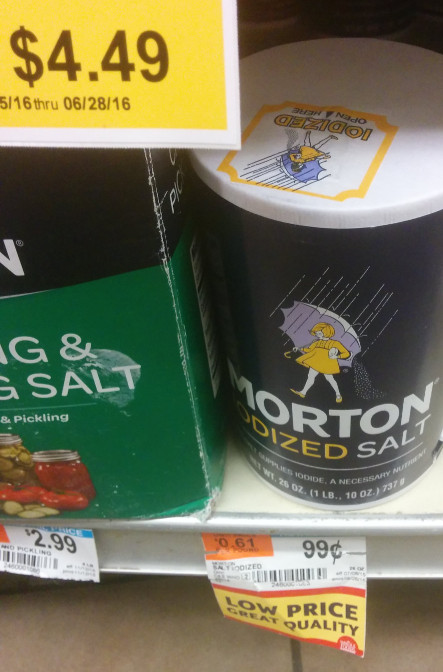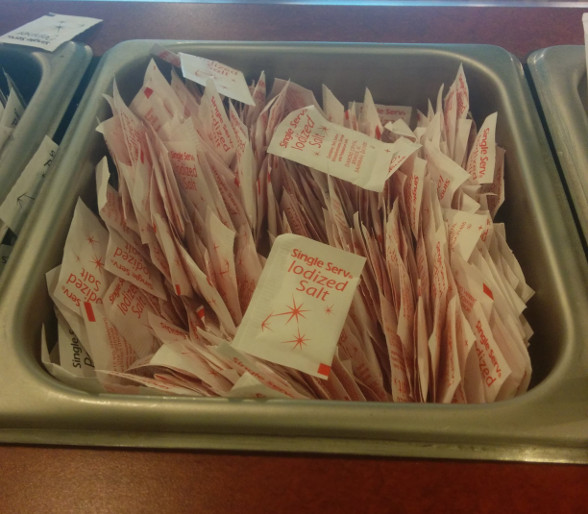Salt, Arbitrage and an Unexpected Pricing Lesson
Saturday, July 23, 2016
My most recent adventure to Whole Foods left me with the usual: an empty wallet and a number of unanswered pricing questions.
As I was buying my biodegradable bag of artisan hipster-approved organic free range potatoes, I realized that I'd want to sprinkle some salt on them.
I'm a simple guy, so I didn't want anything fancy like the pink Himalayan salt that I'm so fond of maligning. Fortunately, plain salt wasn't too hard to find.

I stared at the container and found myself wondering if I could stomach the price. Sure 99¢ isn't much in the grand scheme of things, but perhaps I could find some salt elsewhere for less. Then it hit me. I knew exactly where I could get all the salt I needed at quite the discount. After paying for my potatoes, I walked past the cashier and saw this:

Free salt! Visions of arbitrage danced inside my head. Could I theoretically take all of these free packets of salt, combine their contents, and somehow sell the result back to the store so that it could be made available to less astute customers for 99¢?
I couldn't help but wonder at this pricing oddity. In most cases, businesses actively work to reduce unit prices as quantity is increased. Most of us take it as a given that a small bag of chips will cost more per ounce than does a large one. But in the case of salt at Whole Foods, the opposite appeared to be true. Not only were the packets cheaper per ounce, but they were actually free!
Why would anyone pay for a large container of salt, when he could simply take as much as he wanted for free, in individually wrapped servings? My brain worked overtime like a bunch of Wal-Mart employees who had already clocked out.
The security guard at the store's exit ignored me as I furtively grabbed handfuls of packets. Even my cackling did little to arouse his ire. Thrilled with my illicit booty, I spent several minutes calculating its estimated street value and pondered selling the movie rights to Martin Scorsese.
Initially, I was certain that the economic oddity that I had just uncovered must have been caused by one of the following:
- Lack of knowledge - It was possible that people didn't know that salt was available for free, but how could that be? It was there, at the front of the store. It was literally impossible not to see it.
- Perceived difference in quality - I investigated the matter, but could find no noteworthy differences in perceived quality between the free packets of salt and the next-lowest-priced competitor. Not only were the offerings chemically identical, but they were also labeled with the same description (salt).
- Intentional loss leader - I wondered if maybe the shop was offering free salt as a means to entice shoppers to visit the store. I ruled this out as well. I simply cannot believe that shoppers would be so fickle as to avoid a supermarket that did not offer free salt. I suppose stranger things have happened, but, dollars to donuts, I was certain that this was not the case here. If it were indeed a loss leader, how could the market sell the exact same product for actual money at the other end of the store?
It was then that I began to think in earnest about this question. I soon arrived upon an answer in three parts:
- Packages of salt derive value from their containers - When I try to cook a big meal using tiny packets of salt, I wind up with a big mess of half-empty packets and spilled piles of salt on my kitchen counter. Use of a larger container with a pouring spout reduces the possibility of creating a mess while cooking.
- Fear of social stigma - As the holder of a degree in computer science, I'm immune to social pressures and general good taste. Nevertheless, most people approach the world differently. Upon questioning, many of my acquaintances agreed that only miserly cheapskates (such as myself) would ever rely upon free packets of salt instead of simply buying a larger container. Anyone who dares to use the free salt packets before witnesses risks serious damage to his reputation.
- Brainwashing - Conformists (unlike freethinkers such as myself) have been duped into carving out two distinct product categories where only one should exist. Rather than seeing salt as a single item, they see purchased salt and free salt as different items. Note: I explored a similar effect in watches several months ago. Years of indoctrination by movies, TV shows, friends and acquaintances have trained people to purchase large containers of salt for home use. Outside influences have caused folks to believe that free salt packets are only to be used when no other option is available.
As a result of the three effects listed above, Whole Foods has achieved what many believe impossible. It has found a way to minimize arbitrage by its customers. More specifically, it has found a means to charge for a product that is literally given away for free within its own stores! Not bad when millions of businessmen still think that it's impossible to compete against substantially inferior free substitutes.
Pricing is never as straightforward as it seems. If you'd like to learn more, grab a copy of my book on pricing software or contact me for a consultation. You can trust me - I'm clearly above the salt.